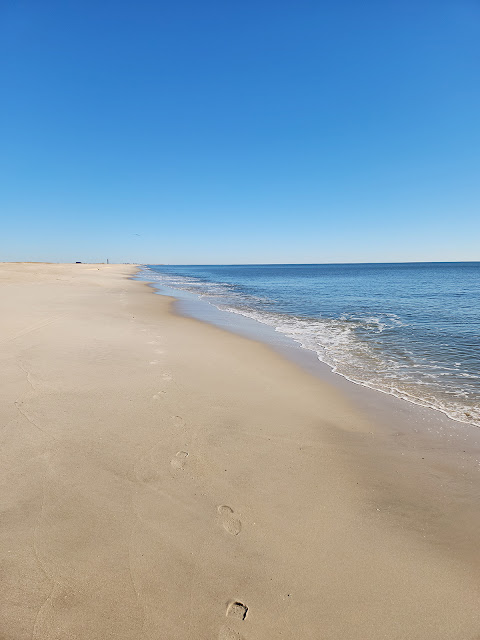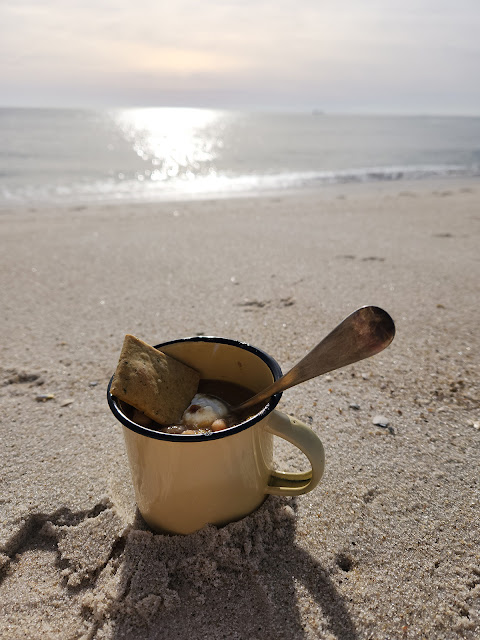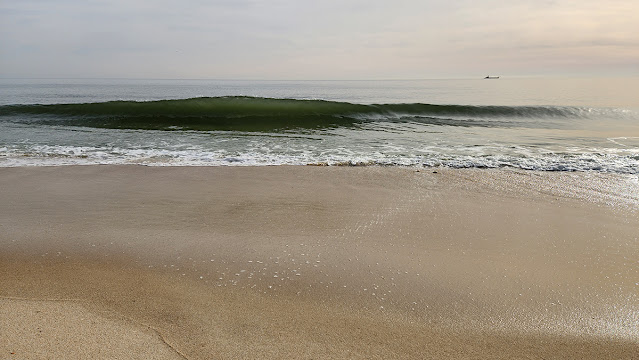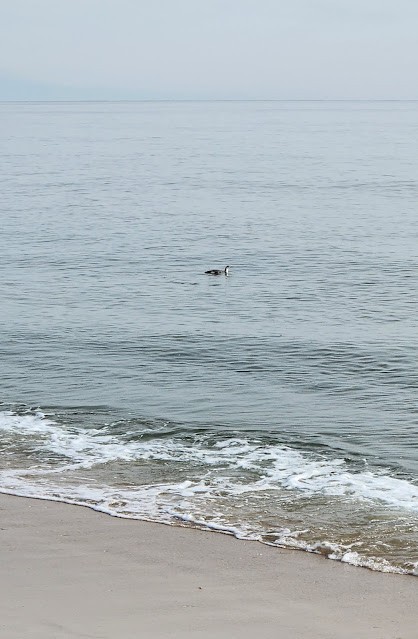After five grey days the sun shone on us, and we pointed our noses towards the ocean. Jones Beach, on a skinny barrier island less than an hour northwest of home, has become a winter haven for us. And it's usually frigid. Sunday was relatively mild. Cold enough enough for layers, and gloves and hats, but balmy by most early January standards.
It was empty. That's why we like it. And we thought we might spot a snowy owl...
Aside from the marring tire tracks on the empty sand, we saw about 12 other people in three hours. Two fishermen, four walkers, and a balance of birders, some alone, some in pairs, most with scopes, some with long lenses. We had binoculars and a long lens, too, so we fit right in. An elderly photographer walking out from the dunes conferred with us. Had we seen anything? Sea ducks on the water, I said, But I'm not sure what they are. Razorbills, he suggested in a Middle European accent: Vot I have been looking for. I wasn't sure. I've seen razorbills in our bird book and these were different. And I knew I'd seen one in Maine... He told us to watch for snow buntings. You can see zem ven zey take off, he advised. We didn't see them, but later we did spot his elusive razorbill, bobbing neatly for fish.
After walking to the rocky arm at the end of the beach we sat and spooned up our hot soup. A flock of dunlin that had been resting on the rocks erupted suddenly, and began the wheeling, shifting choreography that is a murmuration. They broke apart into smaller shapes and blended again, split, and shifted, like nothing real. As we were filming them I noticed a larger bird diving into their flock - a raptor, and probably what set them off in the first place. It flew away, empty-taloned.
And then two of the seabirds came close to shore, hunting in the steep drop-off right at the water's foaming edge. They were loons. Overwintering off our shoreline. One had something skinny sticking up out of its tail feathers - a fishing line? But it was too rigid, more like a quill, and it didn't seem to be bothering the bird, whose movements were sleek and swift. Only at home, his photos viewed on a big screen, did the Frenchman say with some disbelief: It's an antenna! It was. That loon was hooked up to a satellite.
New weather had moved in, blending sea and horizon, smudging air and earth, mixing the light.
There had been no snowy owl, but this will be remembered as an extraordinary day, experienced on the edge of a city teeming with millions and millions of people, in one of the most populated regions on the planet.
Doesn't look like it, does it?
______________







The ocean is endlessly fascinating -- maybe especially when it is calm enough to contemplate without getting over excited. I haven't experienced the Atlantic much, and never like that. But here on the Pacific, I always want to stay all day, because every moment something big is happening, birds swooping in and away, people coming into view and then passing into the distance, the waves lapping uniquely and similarly. You were so smart to bring your picnic. Even the sand in your picture looks "delicious," and is a whole world to behold...
ReplyDeleteThere's no much in life that's better than a good winter day at the beach. glad you got one during our brief warm spell.
ReplyDelete